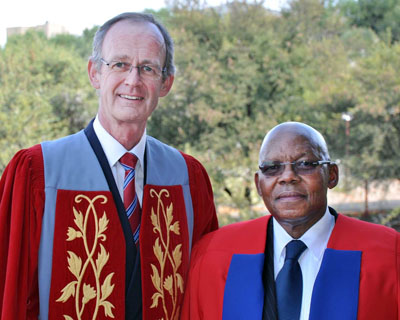 |
Prof. Teuns Verschoor, acting Rector and Vice-Chancellor of the UFS, and Dr Ben Ngubane.
Photo: Stephen Collett |
The University of the Free State (UFS) yesterday conferred an honorary doctorate on Dr Ben Ngubane, Chairperson of the SABC Board, during its autumn graduation ceremony held on the South Campus in Bloemfontein.
Dr Ngubane received the degree Philosophiae Doctor (Honoris Causa) for his immense contribution towards positioning South Africa as a major and an influential player in the development of arts, culture, science and technology internationally.
“I want to thank the UFS for this honour bestowed on me and accept this honorary doctorate in all humility and with great gratitude. I am comfortable to regard myself inextricably part of this university and its mission and will always be a worthy ambassador for this institution and what it represents. I am a proud Kovsie!” said Dr Ngubane after receiving the honorary doctorate.
“The world is changing at a rapid pace. Universities not only respond to such changes, they have become critical engines in the reshaping of that world through knowledge production and research innovation. Sitting at the tip of the African continent, and in the centre of South Africa, it is crucial to the ambitions and agendas of the UFS to be constantly aware of how the world of knowledge, innovation and scholarship is changing with respect to higher education, and how the UFS can best contribute to and benefit from such changes,” he said.
“A university worthy of its name thrives on the universality of ideas and people that come with the cross-currents of international scholars and students on its campus. The International Institute for Studies in Race, Reconciliation and Social Justice, to be launched shortly at the UFS has the potential to become a leading centre of scholarship acknowledged globally.”
Dr Ngubane said that the UFS is now well positioned and has the right strategies in place to become truly internationally recognised, with a proven ability to deal successfully with diversity, embedding in its students a humaneness and respect for the dignity of others, as well as an institution with an increasing through-put rate and with research outputs displaying excellence at international level.
Dr Ngubane was the first Minister of Arts, Culture, Science and Technology in the new, democratic South Africa appointed by the former President, Nelson Mandela, in 1994. He was re-appointed to lead this ministry again by former President Thabo Mbeki in 1999.
As Premier of KwaZulu-Natal from 1996 to 1999, Dr Ngubane is credited for his role in bringing about peace and reducing the political violence that ravaged the province at that time. In 2004 he was appointed as Ambassador to Japan where he initiated, among other projects, the South Africa-Japan University Forum (SAJU).
He holds Honorary Doctorates from the universities of Natal, Zululand, the Medical University of South Africa (Medunsa) and the Tshwane University of Technology.
Media Release
Issued by: Lacea Loader
Director: Strategic Communication (acting)
Tel: 051 401 2584
Cell: 083 645 2454
E-mail: loaderl@ufs.ac.za
19 May 2010